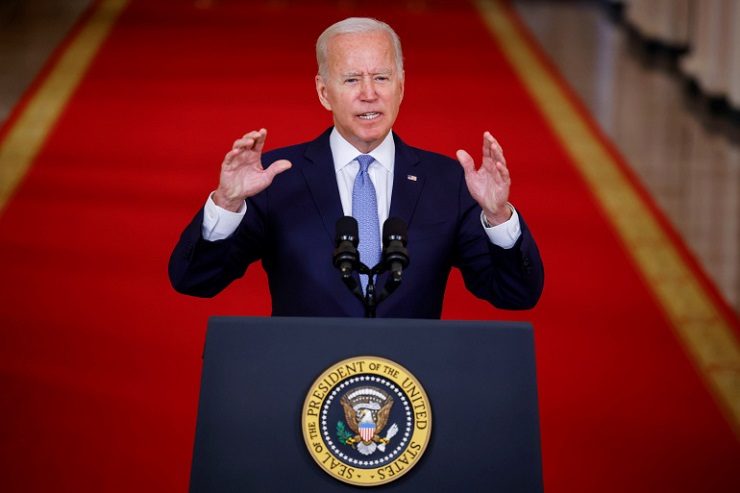United States president Joseph Biden made a speech on 31 August addressing the United States fiasco in Afghanistan. He took the opportunity in that speech to touch upon future United States policies in the multiple United States bases scattered around the world. These bases are estimated to number nearly 800 and are spread around more than 80 countries. At first glance, Biden’s speech contained some promising features. For example, he pledged that the United States would no longer use its military power “to remake other countries.”
He pledged that the United States would “learn from our mistakes.” The casual listener to these words would think that the United States was learning from the error of its past ways and would no longer seek to enforce its views upon the world. Such optimism was to be short lived, as rapidly became apparent when Biden turned to those countries that would prove to be the centre of United States attention in the future.
To no one’s surprise, Biden went on to name the countries that posed the most important threats to the United States “homeland”. They were China and Russia where the United States was engaged in serious competition with, and which posed challenges on multiple fronts respectively.
One day after he gave this Cold War revisited speech, Biden met with Ukrainian president Volodymyr Zelenski, in a long postponed meeting. The White House had previously announced the United States’ unwavering support for Ukraine’s sovereignty and territorial integrity in confronting what it described as Russia’s “ongoing aggression.” After the meeting was finally held, a further statement declared that “the bonds between the United States and Ukraine are stronger than ever.”
A reader of history would puzzle over these allegedly strong bonds, which before the United States sponsored coup against the legitimate Ukrainian government in 2014 hardly existed at all. Ukraine was designed to become yet another weapon in the relentlessly anti-Russian stance adopted by successive United States governments.
The United States interference in Ukraine’s affairs was never in doubt. Russian intelligence leaked an intercepted telephone call from the United States State Department official Victoria Nuland to the United States ambassador to Ukraine, Geoffrey Pyatt, in which she indicated that the United States clearly favoured Arseny Yatsenyuk as their choice to take over from the deposed president Yanukovych.
In his meeting with Zelensky, Biden clearly chose to ignore the patently undemocratic way in which his guest came to power. He preposterously declared that he stood shoulder to shoulder with his Ukrainian guest in their goal to “advance democracy” in Ukraine. It is a view of the country not shared by an international corruption index that rated Ukraine at 117 in a list of 179 countries in their achieving “democratic” government.
Bidens rosy view of his guests government was not shared by his own State Department which noted the country’s record of significant human rights abuses, including degrading treatment of detainees, arbitrary arrest, and serious problems with the independence of the judiciary.
All of these baleful assessments of Ukrainian reality were ignored in the Biden-Zelensky meeting. That meeting included the promise that the United States would use the Russian takeover of Crimea as a stick with which to beat Russia, with the aim of restoring Ukraine’s control of the territory “in accordance with international law.” The two’s use of this phrase is no more than a mockery of the concept.
That last remark is revealing. It rests upon the fiction that Crimea is not legally part of Russia and conveniently overlooks the relevant history. Crimea was for hundreds of years part of Russia. The British and Australians actually fought a war against Russia in Crimea in the 1850s. In 1954 Crimea was transferred to Ukraine by Russia at a time when they were both part of the Soviet Union. It was never a comfortable fit for the Crimean’s who are overwhelmingly Russian speaking and oriented to Russia not only in the language, but also in culture.
The Ukrainian (and United States) view also ignored the fact that the Crimean’s held a vote as to their future following the 2014 anti-democratic takeover in Ukraine and overwhelmingly voted to apply to re-join Russia. Western countries conveniently ignored this Democratic choice, although they have no problem accepting Kosovo’s separation from Serbia.
A point also conveniently overlooked by western critics of the Crimean process is that the Organisation for Security and Cooperation in Europe was invited by the Crimean government to monitor the referendum that decided Crimea’s future which they ignored. It is difficult to maintain opposition to a process that one has been invited to supervise but chooses not to do so.
The United States of course has other motives than merely upholding Ukraine’s point of view. They clearly envisaged the removal of the important Russian military base at Sevastopol which they clearly intended to become yet another of their own bases, right on Russia’s borders. It is interesting that western commentators on the role of Crimea never mention this base, nor America’s ambitions to take it over.
The United States military has lost its cash cow in Afghanistan, but clearly sees a profitable future for its ambitions in Ukraine and more generally a renewed focus on Russia and China has an objective attraction to them. Russia has made it clear that it will not tolerate Ukraine becoming an American weapon in the geopolitical dispute between the two super powers. The Chinese have taken a similar view with the reaction to the blatant United States posturing in Taiwan.
For all his words about a new United States international posture it is abundantly clear that Biden has taken up where Obama left off. As such his policies pose a real danger to the world.
James O’Neill, an Australian-based former Barrister at Law, exclusively for the online magazine “New Eastern Outlook”.

